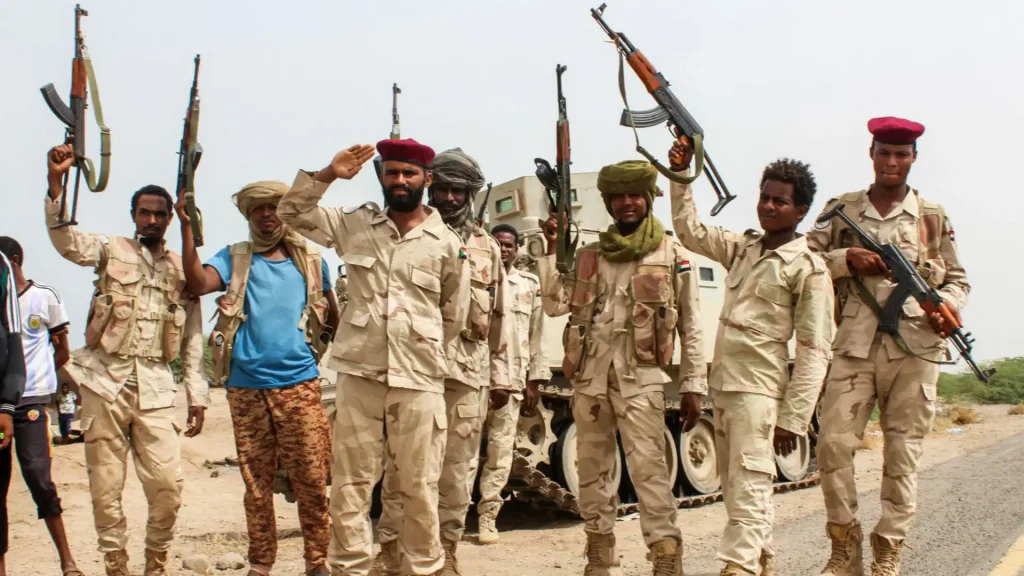A devastating missile strike by Houthi rebels in Yemen’s northwest has claimed the lives of nine Sudanese soldiers, highlighting the ongoing volatility of the country’s protracted conflict. The attack, which occurred on Wednesday in Hajjah province, underscores the challenges faced by the Saudi-led coalition and its allies as they battle the Iran-backed Houthi movement.
Deadly Attack in Midi
The strike targeted a military camp in Midi, a town in Hajjah province near Yemen’s border with Saudi Arabia. According to a Yemeni defense ministry source, “Nine members of the Sudanese forces were killed and 30 others wounded this morning by a Houthi missile.” The source, who spoke on condition of anonymity, was corroborated by another defense ministry official and a local source, confirming the toll. The attack marks a continuation of violence in the region, with a similar Houthi assault in mid-December claiming 14 Sudanese lives in the same province.
The Sudanese soldiers were part of a pro-government coalition led by Saudi Arabia, which has supported Yemen’s internationally recognized government since 2015 in its fight against the Houthi rebels. The Houthis, who control much of northern Yemen, including the capital Sanaa, have intensified their military operations, leveraging missiles and drones to target coalition forces.
Sudan’s Role in the Conflict
Sudan, despite being one of the world’s poorest nations, has contributed thousands of troops to the Saudi-led coalition’s efforts in Yemen, across the Red Sea. Among these forces are members of the Janjaweed militia, notorious for alleged atrocities during Sudan’s Darfur conflict starting in 2003. In 2019, Sudan’s transitional government reduced its troop presence in Yemen from 15,000 to 5,000, reflecting a shift in priorities amid domestic challenges.
However, Sudan’s involvement has not been without controversy. In early 2020, protests erupted in Khartoum as families alleged that relatives, recruited by a United Arab Emirates-based firm under the guise of security guard positions, were instead deployed to conflict zones in Yemen and Libya. The UAE, a key member of the Saudi-led coalition, has played a significant role in the coalition’s operations, adding complexity to the regional dynamics.
Yemen’s Humanitarian Crisis
The Yemen conflict, which escalated in 2014 when the Houthis seized Sanaa, has been described by the United Nations as the world’s worst humanitarian crisis. The war has displaced millions, with over 150,000 deaths reported by 2021, including both combatants and civilians, and has left millions more facing famine and disease. The recent strike in Hajjah is a stark reminder of the ongoing violence that continues to devastate communities and infrastructure.
The Houthis’ control over northern Yemen, coupled with their access to Iranian support, has enabled them to sustain their campaign against the coalition. Their actions, including missile strikes like the one in Midi, have further complicated efforts to achieve a lasting ceasefire, despite international mediation attempts.
Regional and International Implications
The attack comes amid heightened tensions in the region, with the Saudi-led coalition facing increasing pressure to counter Houthi advances. The involvement of Sudanese troops, many from marginalized regions, highlights the broader geopolitical stakes, as poorer nations are drawn into proxy conflicts fueled by regional powers. The coalition’s reliance on foreign troops also raises questions about the sustainability of its strategy in Yemen.
As the conflict persists, the international community continues to call for a resolution to alleviate Yemen’s humanitarian suffering. The recent strike serves as a grim reminder of the challenges in achieving peace, with both sides entrenched in a cycle of violence that shows little sign of abating.






